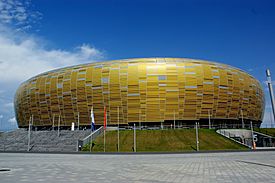2019–20 UEFA Europa League facts for kids

The Stadion Energa Gdańsk in Gdańsk will host the final
|
|
| Tournament details | |
|---|---|
| Dates | Qualifying: June – August 2019 Competition proper: September 2019 – 27 May 2020 |
| Teams | Competition proper: 48+8 Total (expected): 158+57 (from 55 associations) |
The 2019–20 UEFA Europa League was the 49th time this exciting football tournament took place. It is Europe's second-biggest club football competition, organized by UEFA. This season was also the 11th since the tournament changed its name from the UEFA Cup to the UEFA Europa League.
The final match of the 2019–20 UEFA Europa League was played in Gdańsk, Poland, at the Stadion Energa Gdańsk. The team that won this tournament got to play against the winners of the 2019–20 UEFA Champions League in the 2020 UEFA Super Cup. Winning the Europa League also meant they automatically got a spot in the group stage of the 2020–21 UEFA Champions League. If they had already qualified for the Champions League through their national league, their spot went to another team.
Understanding How Teams Qualify
Teams earn their spot in the UEFA Europa League in different ways. This depends on how well they did in their own country's football leagues and cup competitions. Here's what some of the special labels mean:
- CW: This stands for "Cup Winners." It means the team won their country's main cup competition.
- 2nd, 3rd, 4th, 5th, 6th, etc.: This shows the team's final position in their national league. For example, "5th" means they finished fifth in their league.
- LC: This means "League Cup winners." Some countries have an extra cup competition, and winning it can earn a spot.
- RW: This means "Regular season winners."
- PW: This stands for "End-of-season Europa League play-offs winners." Some leagues have special play-off games to decide who gets a Europa League spot.
- UCL: This means the team transferred from the UEFA Champions League. These are teams that started in the Champions League but didn't make it through certain stages.
- GS: Teams that finished third in their Champions League group stage.
- PO: Teams that lost in the Champions League play-off round.
- Q3: Teams that lost in the Champions League third qualifying round.
- Q2: Teams that lost in the Champions League second qualifying round.
- Q1: Teams that lost in the Champions League first qualifying round.
- PR: Teams that lost in the Champions League preliminary round.
Some teams might have been listed as possibly qualifying for the 2019–20 UEFA Champions League. This could happen if they did very well in their own league, or if they won the 2018–19 UEFA Champions League or the 2018–19 UEFA Europa League in the previous season.
Related Football Competitions
- 2019–20 UEFA Champions League
- 2020 UEFA Super Cup
See also
 In Spanish: Liga Europa de la UEFA 2019-20 para niños
In Spanish: Liga Europa de la UEFA 2019-20 para niños
 | Frances Mary Albrier |
 | Whitney Young |
 | Muhammad Ali |

